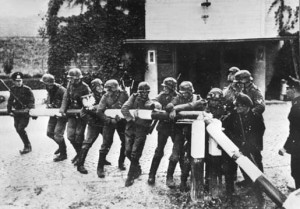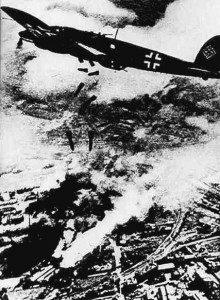Part I, part II, part III, part IV, part V
… Poland suffered a crushing defeat at the speed of light. Columns of German tanks easily broke through the defenses of the Polish divisions and stormed into the breach. By Sept. 8, 1939, the eighth day of the war, armored units of Goths were already approaching the Polish capital. Warsaw heroically resisted until Sept. 27, but then surrendered. The ruling elite, who had dragged their country into this bloodbath, had no wish to display heroism. As early as Sept. 5, upon receiving the first reports that columns of tanks were hurtling toward the capital, the Polish leaders fled to Lublin, and on Sept. 17 they escaped across the Romanian border. Following on the heels of the government, the senior commanders and general staff of the army also cut and run. Instead of shooting down and crashing into German planes and dying with honor in battle, approximately 500 Polish aircraft flew off for Romania, Latvia, and Lithuania.
No mobilization was announced in Poland. Or, to be precise, two days before the war, on Aug. 29, 1939, Poland still resolved to do that. But then they reconsidered. The posters that had already been hung from the walls of buildings in Polish cities and villages, announcing the beginning of the army’s mobilization, were torn down. Why did the Polish leaders do something so odd? Because the British and French ambassadors officially asked the Poles to put off any announcement of a mobilization until Aug. 31. Meanwhile, the leaders of the Western democracies were well aware that the German invasion would occur in the early morning of Sept. 1. The British and French diplomats’ request had only one goal: to make it easier for the German army to deal the first blow.

The Poles grasped the sobering reality very quickly. On Sept. 1, the head of the Polish foreign ministry, Józef Beck, the very man who at the crucial juncture of the Polish-German talks had suddenly flown to London instead of Berlin, immediately telephoned the British ambassador in Warsaw, Howard Kennard, and informed him that the war between Germany and Poland had begun. Warsaw awaited the immediate reaction of its allies. And it came. The British and French gave the German government a note stating that they would honor their obligations to Poland if the Germans did not stop the invasion. London and Paris at the same time assured Berlin that those notes were only warnings and not ultimatums. The British and French ministries of foreign affairs continued to support Hitler’s illusion that they would not go to war on Poland’s behalf. Their primary task was not to stop the German invasion, which could lead to negotiations, but to encourage more fighting so that Poland would quickly be decimated by the German army that could then emerge right up against the Soviet border. Therefore, despite the fact that on Sept. 1 the British king had signed an order to mobilize his army, navy, and air force, and the French prime minister had issued a similar decree in France, Hitler was convinced that the Allies would not start fighting. It was even possible that no declaration of war would ever be made. The Poles needed to be finished off as soon as possible, and then the very impetus for the conflict would disappear. And even if a war was formally initiated, it would be possible to begin negotiations once again with the West under some sort of pretext once Poland had been destroyed.
This was how the leader of Germany saw the situation. But he was not the only one deceived by the Western diplomats’ maneuvers. Very slowly Poland’s leaders began to grasp that Britain and France’s prewar promises had been mere empty words. Where were the promised aircraft? Why were the Allies’ air forces still not bombing German targets? Why was France not providing Poland with assistance as per their treaty? When would France declare war against the aggressor?
The Polish ambassador put these and other questions to the French foreign minister, Georges Bonnet, in the French capital. Bonnet’s answer makes it perfectly clear that Paris wanted to give Hitler a few days’ head start so that the German army would have no trouble breaking the backbone of the Polish Army. Bonnet stated that the French government could only send an ultimatum after “a decision by the parliament, which would meet in the afternoon.” And that ultimatum, which still had to be sent to Berlin, would not expire until 48 hours had passed. And only then would it be possible to declare war.

That answer horrified the Polish ambassador. The Poles’ despair is easy to understand: we’ve done everything you told us to do, but now they’re bashing us for all they’re worth and we’re getting no support. The Poles lost their patience and were no longer asking, but now demanding what they had been promised. On the evening of Sept. 2, after the French parliament had met, the Polish ambassador again addressed Minister Bonnet. He replied that the issue of the German ultimatum still needed to be discussed at a meeting of the council of ministers. “Then the Polish ambassador lost his temper and told Bonnet exactly what he thought of him and also demanded that Germany immediately be presented with an ultimatum.” Precisely the same scene was witnessed in the British capital. On the night of Sept. 3, the Polish ambassador in London was instructed to immediately go to Lord Halifax and remind him of the British government’s commitments.
Then a disgraceful, sordid political game began in the West, which would go down in history as the “Phoney War.” On Sept. 3, 1939, Great Britain and France actually declared war on the Third Reich. The Polish military mission immediately left Warsaw and flew to London. It is easy to guess that the Polish generals came to discuss specific joint actions to be taken in order to obliterate the invading aggressor. We can barely fathom the emotions these patriots must have been feeling. Furthermore, the Polish military mission was left waiting for an entire week before they were received by the British Chief of the Imperial General Staff, General Edmund Ironside!
When he did consent to see the Poles, he immediately told them that the British general staff had no plan to help Poland, and he advised the Poles to purchase weapons … from neutral countries! In response to the Poles’ fury, Gen. Ironside relented a bit and promised to allocate 10,000 obsolete Hotchkiss rifles and 15-20 million cartridges for them. German tanks were racing toward Warsaw and the constant incursions by German planes were wiping out the Polish divisions surrounding the city. In order to survive, Poland needed anti-tank and anti-aircraft guns and fighter planes. But the British were in essence suggesting that they take out German tanks and airplanes using antiquated rifles!
But this was not all! In truth there was no end to their treachery! For the British would not promise to deliver the useless rifles to Poland for another … 5-6 months! But in the real world, the war between Germany and Poland was completely over in less than a month. London’s “assistance” amounted to a complete lack of the promised assistance. Poland had been shamelessly deceived by her allies. And this betrayal no longer looks like unfathomable stupidity or simple blindness, once one has a proper understanding of the true goals of London and Paris. On the contrary, their treachery was the logical result of all the prewar diplomatic commotion within the Western governments and was the natural consequence of British and French policy.
There can be no doubt that Poland’s leaders fully grasped the ignominy of their allies’ actions. One significant fact: the Polish government-in-exile (in Paris and later in London) was made up of entirely different personalities than the pre-war leadership. The reason is simple: those who had been betrayed by the British no longer wished to work with them. And it was much easier for the British themselves to engage with people to whom they had not made any promises.

ORIENTAL REVIEW published exclusive translations of the chapters from Nikolay Starikov’s documentary research ““Who Made Hitler Attack Stalin” (St.Petersburg, 2008). The original text was adapted for translation by ORIENTAL REVIEW.
PREVIOUS EPISODES
Episode 14. How Adolf Hitler turned to be a “defiant aggressor”
Episode 13. Why London presented Hitler with Vienna and Prague
Episode 12. Why did Britain and the United States have no desire to prevent WWII?
Episode 11. A Soviet Quarter Century (1930-1955)
Episode 10. Who Organised the Famine in the USSR in 1932-1933?
Episode 9. How the British “Liberated” Greece
Episode 7. Britain and France Planned to Assault Soviet Union in 1940
Episode 6. Leon Trotsky, Father of German Nazism
Episode 5. Who paid for World War II?
Episode 4. Who ignited First World War?
Episode 3. Assassination in Sarajevo














Pingback: Episode 15. Poland Betrayed (VI)… | Protestation
Pingback: Oklamané Polsko (VI) – Nová republika